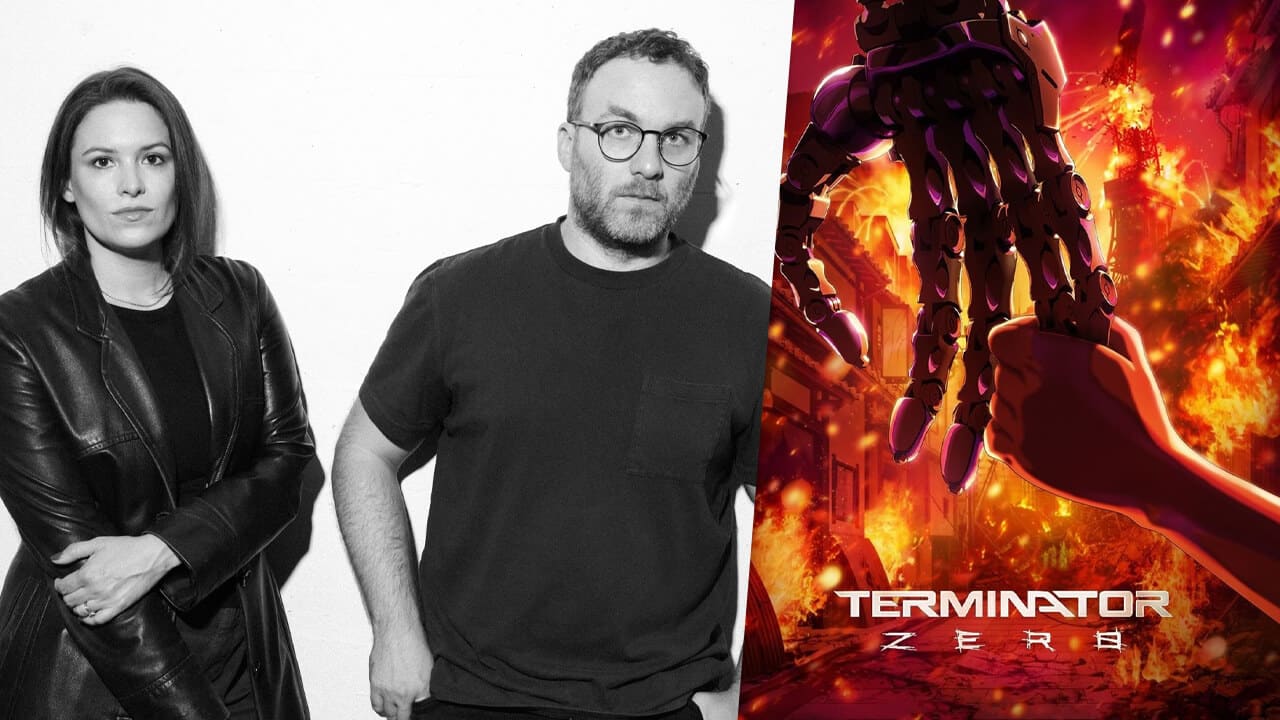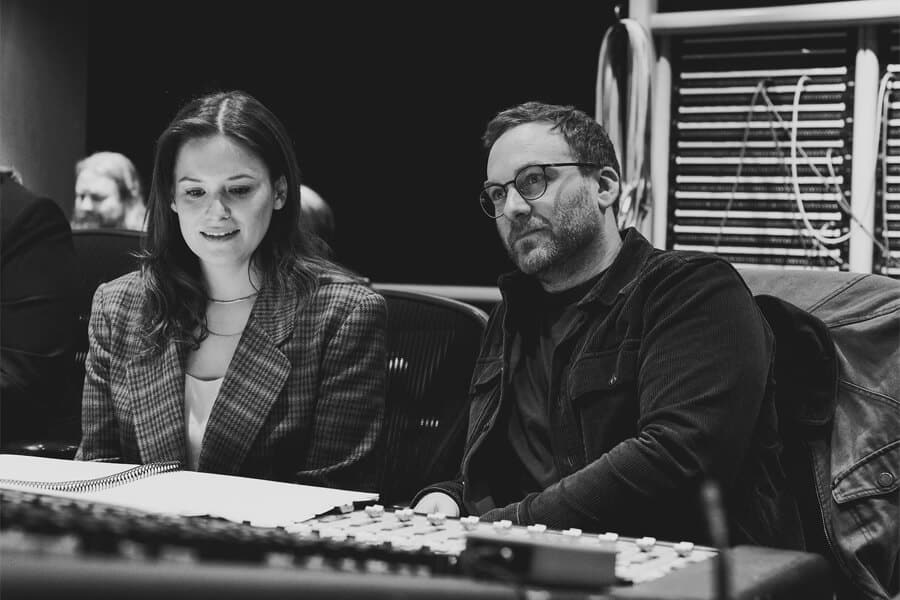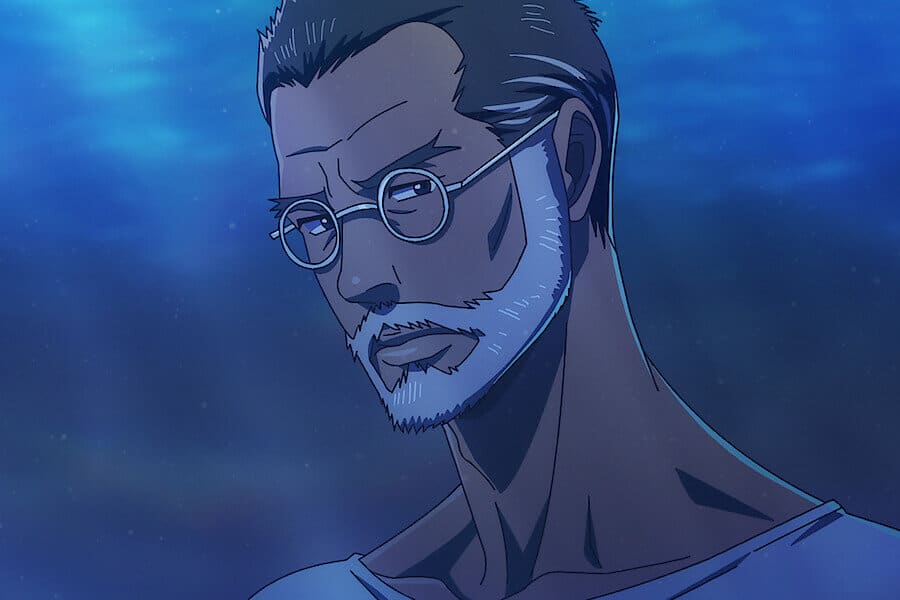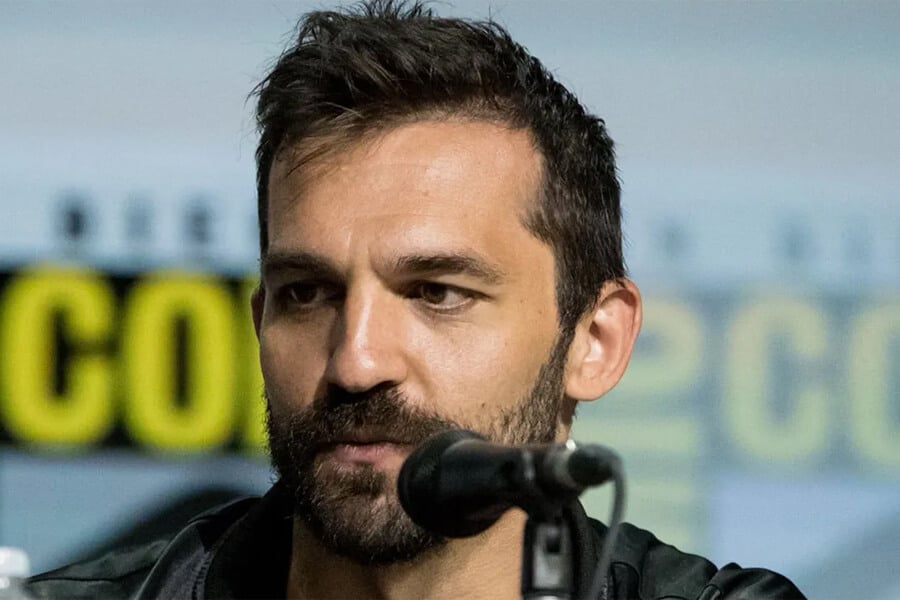
Picture: Michelle Birsky (left) and Kevin Henthorn (right), the composers of Terminator Zero.
Netflix’s newest adult-animated comedy, Terminator Zero, just landed on the streaming service, and recently, we had the pleasure of discussing the score with composers Michelle Birsky and Kevin Henthorn.
Terminator Zero is a brand-new Japanese sci-fi anime series set in the world of the beloved sci-fi franchise Terminator. Mattson Tomlin is the showrunner and writer of the series, with Masashi Kudô as the director. Production IG is the animation studio behind the anime.
The anime takes place in 1997 in Tokyo, Japan, where scientist Malcolm Lee has developed an AI to rival Skynet. However, in response to this threat, Skynet sends a Terminator back in time to assassinate Lee and destroy the AI. At the same time, Eiko, a woman from the future, is sent back in time to protect Lee and his family from the metal menace.
Before working on Terminator Zero, Michelle Birsky and Kevin Henthorn collaborated on Hulu’s Mother/Android score and the television series The Lesbian Bar Project. Birksy has also composed for several independent projects, such as Divine Mother, Fume, and Girl Talk. Together, the pair moved from New York City to Los Angeles with their cat, Wednesday, where they now work as a husband and wife-composer duo.
In addition to composing, Kevin Henthorn is an alt folk-rock artist who plays under the moniker Cape Francis. Michelle Birksy also works as an artist and music producer and spent several years performing under the moniker of Birch.
Jacob: How did you first become involved with Terminator Zero?
Michelle: We were working with the showrunner, Mattson Tomlin, on his film Mother/ Android, and he mentioned that he was writing a Terminator anime. So, we decided to write a bunch of music for him and send it to him completely unprompted, which is always a risk, but it worked out! He liked it and put it into the music library that they were working with in Japan, where they were animating at Production IG.
So, two years go by, and they are finally ready to hire a composer. I don’t think they intended to hire an American or even a composer on the Japanese side. But they had been animating to our music, which they didn’t realize. They really liked some of the tracks, so they gave us a shot and we got to audition for the first episode, which was a terrifying and stressful time. But after that first episode, we were officially hired to do the whole season.
It was an incredibly smooth process for something being done in two countries where translators are needed. Everybody was on the same page about what we were trying to create.
Jacob: It sounds like you both manifested destiny there.
Michelle: Yeah!


Picture: Michelle Birsky (left) and Kevin Henthorn (right)
Jacob: How would you describe your score for the series?
Kevin: Very electronic. The themes of the show are pretty heavy. So, I feel like existential dread is a big undercurrent in our score’s tone. But we also got to record the London Contemporary Orchestra for a small choir. So, marrying both choir elements, which were very human with this electronic backdrop, was kind of what we were going for.
Jacob: In preparation for our chat, I watched all of Terminator Zero and enjoyed the series and the score.
Kevin: Thank you, that’s so good to hear.
Jacob: Will there be a Spotify release?
Kevin: We don’t know the exact date, but yes, the music is coming!
Jacob: That’s cool. When you’re watching the show, you’ve got all the other audio, from dialogue, weapons, and other sound effects, so I’m looking forward to listening to it in even more detail.
Jacob: How does it feel to be part of the Terminator franchise?
Michelle: It feels very surreal.
Kevin: Very incredible.
Michelle: Working on such an iconic franchise and creating an entirely new score for it was a daunting process. But it’s been a cool experience, and it’s also just fun that this is an anime because you can take it in a completely different direction.
I think we would have felt more shackled to the original [score] if we were creating for live-action. But because it was anime, it gave us a little bit more freedom to go a little bolder with the sound.
Jacob: You mentioned one of your previous scores, Mother/Android, which shares themes similar to those of the Terminator franchise. Did your experience working on a sci-fi project help prepare you for working on Terminator Zero?
Kevin: Oh, totally. By working with Mattson, I think we also know what he likes and what he’s after emotionally with the music. So, Mother/Android really helped. It was very different, though, because in that film, we wanted the sound to be like whatever the characters had on them, like pots and pans while out in the woods. So it was really sparse, with light guitar work and piano, but I think for Terminator Zero, the scope was so much bigger. And, again, as Michelle said, with the anime aspect, we felt we could go a lot bolder at times, especially with character themes. I feel like the action scenes were pretty heavy in this one.
Jacob: I’ve enjoyed many character moments, even when there’s been less action on screen. To me, this solemn vibe runs throughout the show, which I felt matched the tone of this race against time to stop judgment day. I thought Malcolm Lee’s theme was great, especially.


Picture: Malcolm Lee in Terminator Zero – Production IG.
Kevin: Yeah, Malcolm’s theme was really the heart of the Terminator theme and the show. That was from an early demo that we sent Mattson, which just stuck to this day. So, that’s the jumping-off point.
Jacob: So, once you were both hired as the composers, how much extra work did you have to put in compared to what you’d sent in originally?
Kevin: Oh, oh, so much. There were a couple of demos that were good jumping-off points. There was one during a scene in the first episode where Malcolm is going through the city, and the cue is called, “It will never be the same.” That was probably the only one that was very close to the demo.
Michelle: The opening is the first thing you hear in the score as well.
Kevin: Yeah!
Michelle: That was a demo.
Kevin: Right, but that had to be reworked quite a bit.
Michelle: We did have to rework it a lot!
Kevin: Because you end up with four minutes of action instead of two minutes, which added a lot more work. Especially the workflow with working to animatics over the course of a year, so it was intense but super rewarding.
Jacob: You said before that the animators at Production IG were animating to your music. Once you were composing full-time, was there any collaboration between you all? Did they request anything from you?
Michelle: Yeah, it was very collaborative. We had a month, a month and a half, or sometimes even two months per episode. What it was is we’d get the animatic, but we knew the timing would change slightly.
So, everything we did had to do with a grain of salt, and it wasn’t necessarily going to be the final product. We would score the episode, send it to Mattson, get his notes, fix it, send it to Netflix and IG, then get their notes, fix it, send it back, and then between all this there were sometimes timing changes.
At a certain point, we brought our music editor on board, Ariel Lowe, whom we’ve worked with many times before. It was super helpful to have someone who could help out with small timing changes when the animation was finalized.


Picture: Mattson Tomlin
Jacob: What was it like working on such a high-profile IP as the Terminator? Did you take any inspiration from the previous entries? My impression was that this was very unique and self-contained.
Kevin: That was definitely the goal to have it be its own thing. I think the only thing we took from Brad Fiedel’s score was the drumbeat rhythm, da-da-da-da-da, which was featured at the end of episode one. That was something that Kudo, the director, really wanted. It worked well with what we were already working on for the theme, so it felt like a really good use and callback to the original score.
But, regarding the elements, we wanted to push it in a different direction, much more modern. So we used a choir, which I think the past score used many more string sections, and we just wanted to stray away from that and do something different.


Picture: The T-800 in Terminator Zero – Production IG
Jacob: What was it like working with Mattson again? Were you given a lot of freedom to experiment?
Michelle: He’s our favorite person to work with. We start by doing a spotting session with him to discuss where we want the music and emotion of that scene to feel. Then we experiment, produce something new, and send it to him.
For the most part, we understood what he wanted, so it was a very symbiotic and collaborative way of working. It is pretty rare to find someone who is so open-minded and communicative.
It’s not that he’s speaking in musical terms, but we can speak to each other in the same language in terms of emotion, and then we take it from there, and he’s usually on board with that. When he’s not on board, he tells us, and it’s easy. There’s no BS, so it’s really nice.
Jacob: So, what are you guys working on next?
Kevin: We’ve got a horror movie that’s in the works that we can’t talk about just yet and a few other projects we can’t talk about. I have a music project outside this, so I’m working on another album. It’s the project called Cape Francis, so I’m just doing that.
Michelle: Yeah, some things are in the works!
Did you enjoy Terminator Zero? Did you enjoy the score of Terminator? Let us know in the comments below.


